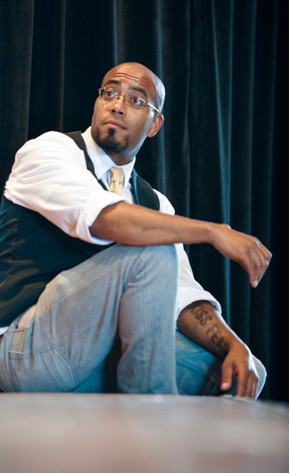Literary and Artistic Intern Rebecca Fredrickson spoke with Co-Adapter Daemond Arrindell about poetry and point of view in his work on Welcome to Braggsville.
RF: Book-It doesn’t normally add to the texts of the books it adapts with substantial pieces of new writing. What about this story in particular made it important to write new poetry?

DA: Well, they are new and they aren’t at the same time. I created Found Poems from several very short chapters. The words are still the author’s, but where I come in is playing around artistically with the orientation, repetition, and order of those words, always with the goal of providing the audience with insight into the characters. The book does this so well but has lots more time to work with. In the play, we have limitations placed upon us so that insight into our main characters is utterly vital.
Braggsville is a really nuanced book addressing our complex and complicated relationships with race, history, privilege, bias, etc,. There are some specific chapters within the book where the narration shifts from the third person, using “he, she, they” to speaking directly to the characters as if it was a one-way conversation. The tone, rhythm, and language of these short chapters are all different from the rest of the novel. They felt reminiscent of spoken word poems. They needed something different, something more than the audience seeing and hearing an internal monologue. I had a vision for turning these chapters into found poems because they reminded me of an exercise from Theatre of the Oppressed by Augusto Boal called “Rainbow of Desire” in which the players from a challenging situation are frozen in time and then voice what they most need or desire within the situation. These desires may or may not be known to others and perhaps even to the characters themselves—the intent of one’s words and actions can be very different from the impact and these chapters seemed to provide an opportunity for the characters to wrestle internally with their motives. So that is what I am striving for in those sections of the play.
RF: How did you incorporate T. Geronimo Johnson’s words into your poetry?
DA: Found poetry is created by taking words, phrases, and sometimes whole passages from other sources and making changes in spacing and lines, by adding or deleting text, to create new meaning. My take on it was to use the words of the original text to reveal to the audience what the characters were driven by, were in contention with, and were questioning. Repetition in poetry is a powerful tool for digging deeper into the subject matter. As the characters and the poet dig into the underlying layers of the motives behind their choices, we learn a great deal about who they are as people.
RF: How has your experience as a poet informed your work as a playwright and adaptor?
DA: One explanation that I offer my students is poetry is about the economy of words—how do we say the most with the fewest number of words. So while in everyday conversation I find myself quite long-winded, on the page I am trying to cut away the extraneous and unnecessary to clear a path for what is ultimately true. Within a piece of text, I am often looking for the heart line—the one line that, like a thesis statement, hits the nail on the head of what the author is really trying to say. This tactic serves me well as an adaptor and as a playwright: I’m looking for (or striving to create) language that will communicate powerfully and, I hope, connect with an audience
RF: In your experience, what is the relationship between the arts and social justice?
DA: Social Justice requires the arts—requires creativity and critical thinking—a willingness to see things through different lenses. The rigidity with which many people see the world is what cuts many of us off from who we can be. There is no social movement I can think of where the arts did not play a pivotal role. So often it is the artists who are calling attention to the problems in the world and doing so in a way that humanizes an issue and builds empathy or uplifts us to foster hope or motivates us to action. It is the artists who help us to envision a reality different than the one we live in, that show us the possibility, the ones who challenge the status quo and make the invisible visible.
The razor-sharp Welcome to Braggsville runs June 7-July 2, 2017. Tickets available here.